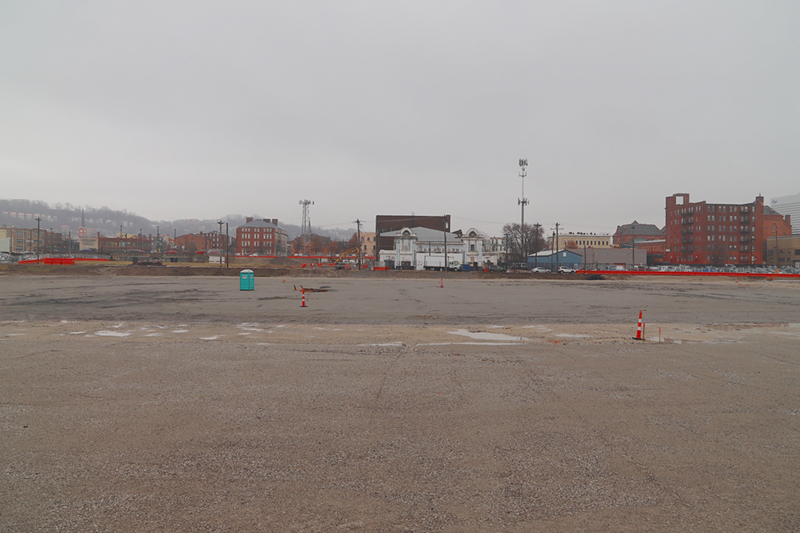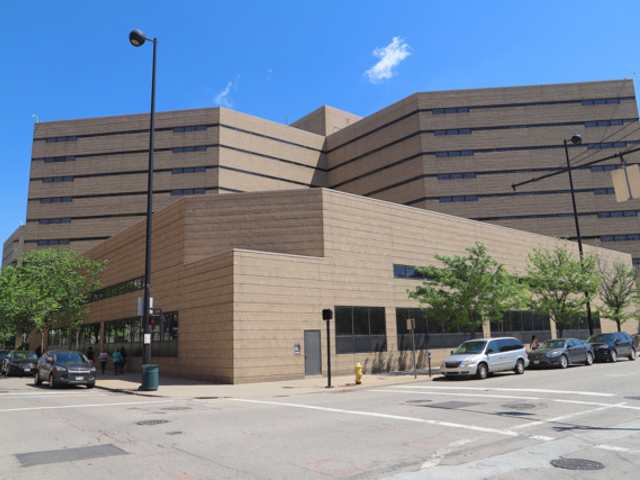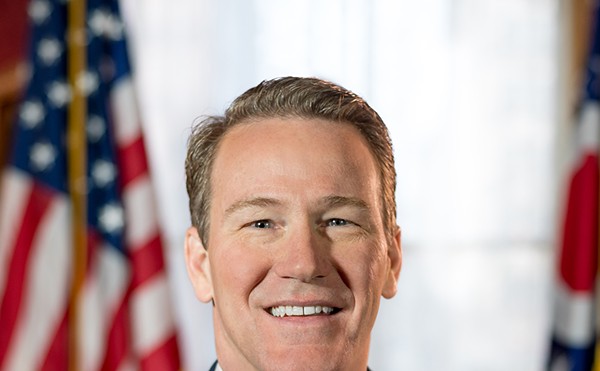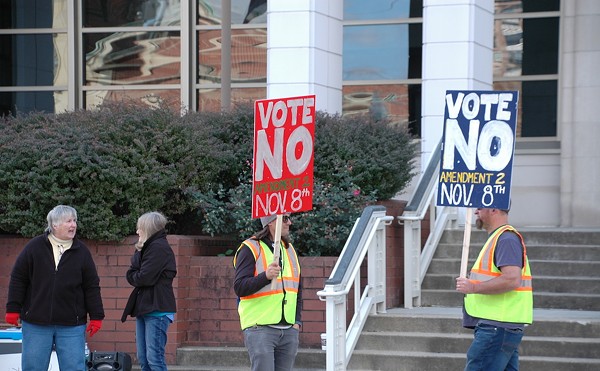Cincinnati City Council's Budget and Finance Committee passed a key approval for FC Cincinnati's coming West End stadium today, priming a final vote on the $250 million facility in council's weekly meeting Wednesday. But even if legislation around a land deal and zoning variance pass, questions will likely linger.
A recent study about the impact stadium noise could have on Music Hall, concerns about parking and street closures, a displaced West End business owner and details around the transfer of city land in the stadium’s footprint all remain up in the air as the team moves toward a March 2021 opening for its new Major League Soccer facility.
Ticket Tax Revenues
The biggest piece of the puzzle seemed ready to slide into place last week, when Mayor John Cranley presented council with a deal that would deed FC Cincinnati city-owned land appraised at $1.6 million. But that deal hasn’t been simple.
The land has been a sticking point between council and the team, which had originally asked that the city give it a portion of a parking lot north of Cincinnati Police District 1 Headquarters and part of Central Avenue for one dollar. Council balked at that.
Cranley’s new deal would still give FC Cincinnati that land for a dollar, but would net the city some extras in exchange.
Some council members, however, have questioned how much value the deal brings to the city.
The largest part of the deal would be the promise of $400,000 a year until 2031 in ticket admissions taxes from stadium events. Anything over that would be put into development efforts around the stadium — potentially a new garage at the Town Center garage site on the corner of Ezzard Charles Drive and Central Parkway. Some members of council want the very specific area where ticket tax revenue overages could be spent extended to the entire West End, however.
A revised version of the deal will set aside proceeds above $5 million will go into the city's general fund.
FC Cincinnati says ticket sales at Nippert Stadium generate about $250,000 in admissions taxes a year, though ticket prices will rise when the team joins Major League Soccer.
At today's Budget and Finance Committee meeting, council member P.G. Sittenfeld said that that the team estimates it will generate about $370,000 a year in ticket tax revenue should it sell out every game.
But council member Chris Seelbach has said the city will likely see that much in ticket tax revenue without the deal in coming years as the team ups its ticket prices, and that the guarantee the team is offering doesn't add up to much value for the city.
The Parking Garage
The other extras on offer center around the Town Center Garage across Ezzard Charles Drive. Those include payments from the team of about $55,000 a year to replace parking revenue lost when officers begin parking at the garage just south of CPD headquarters, up to $750,000 from FCC to add a 67-space parking lot near that garage, and another $300,000 to help move an evidence processing unit from CPD District 1 to District 3.
The team would also lease spaces in that garage from the city starting at $150,000 a year until 2025, when the cost would increase every two years.
In return for all of that, the team would get the roughly one acre in parcels from the city and the first rights to buy the land occupied by CPD District 1 if the city decided to sell it.
However, the city likely stands to get more money if it keeps the garage under its control on game days and sets parking prices itself. It stands to make slightly more than the $150,000 a year if it charged its current special events rate of $10, and could up the price to $20 — a level the team is rumored to be considering.
Also worrisome for some members of council — a provision that would stick employees of public radio and others nearby with game day rates on days FCC has control of the garage, even if they have monthly passes.
Seelbach says the deal seems better than the initial ask by the team, which faced dubious prospects in council. But he said he still wasn’t satisfied with it.
“Looking at what we have before us and being expected to vote on it on Wednesday, this is a mess,” he said Feb. 11.
Just Cookin'
There are other potential sticking points, several council members say, including the fate of West End business owner Monica Williams’ soul food restaurant Just Cookin’. Williams, along with two other businesses and one resident, had to relocate late last year from their rented spaces in the State Theater, which is in the stadium’s footprint. Those businesses originally got $20,000 from FC Cincinnati, which they said would not be enough to reestablish themselves at new locations.
FC Cincinnati has pledged to provide another $50,000, pay Williams’ rent at a new location for two years and to help her find a new location in the West End, where she wants to remain. One location on Linn Street in the City West development seems promising, parties working on the situation agree, but Williams faces a $200,000 gap in terms of financing build-out there.
Council member Greg Landsman says a deal is close to relocate Williams.
“There should be something in the next 48 hours for people to look at and say, ‘This is great,’" he said after the Feb. 11 committee meeting. “Assuming it works for Monica, it seems to be heading in that direction.”
Williams says she is still very nervous about the state of her business and has taken a third-shift job at Kroger in the meantime.
Arts Organizations
Other potential snags include recently released report showing that noise from the stadium could bleed into Music Hall’s Springer Auditorium and rehearsal spaces.
The team has pointed out that its current home, University of Cincinnati’s Nippert Stadium, is closer to UC’s College-Conservatory of Music than the new stadium will be to Music Hall, and that there have been no complaints about the current location. Others, including Mayor Cranley, have pointed out that the noise level will be relatively low — about a quarter of the sound bleeding into Music Hall from passing streetcars, which hits about 48 decibels according to a city study.
But some council members remain skeptical. Council member David Mann pointed out that the science behind acoustics is more complicated than the mayor and FC Cincinnati suggest, a notion Connecticut consulting firm Akustiks, which issued the preliminary report, mentioned in a rebuttal letter to the team.
“If the sound is 68 decibels and you add another 12, which I think is what the report says, now you’re at 80,” Mann said, pointing out that decibels don’t compound in a linear fashion. “That is a lot louder than 68. We should probably consult somebody who understands this stuff.”
A final report from Akustiks, including potential noise mitigation solutions, is due this week.
FC Cincinnati President Jeff Berding Feb. 13 released a statement saying the team had come to an agreement with the Cincinnati Arts Association, which represents the Cincinnati Symphony Orchestra and other arts companies that perform at Music Hall.
"Pleased to announce we have reached agreement with Cincinnati Arts Association, CSO, Opera & other Arts organizations for Music Hall," Berding tweeted. "Carl H. Lindner III has signed, and we expect to have a fully executed agreement by 1:00 pm today."
Also still up in the air — a dispute over the parking lot of the Cincinnati Ballet, which sits on the corner of Central Parkway and Liberty Street. The ballet, which holds a 17-year lease on the space owned by FC Cincinnati, last week sent council members a letter asking them to hold off on a vote until the situation is resolved. In that letter, an attorney for the ballet says that the team’s zoning variance request is invalid because it does not have complete control of the land for which it is seeking the zoning change.
Central Parkway and Other Resident Concerns
The zoning variances passed through the city’s Planning Commission, which approved the team’s initial development plans for the six-story, 26,000-seat, 62,000-square-foot stadium last month.
One of the elements of the plan approved by the commission includes temporary closures of Central Parkway, a major artery downtown, during game days. Despite inclusion in the planning documents presented to the planning commission, approval of those closures would likely fall to the Cincinnati Police Department. Council members Chris Seelbach, Tamaya Dennard, Greg Landsman, P.G. Sittenfeld and Wendell Young have signed a motion that would oppose closures of the parkway.
Assistant City Manager John Juech says the city is considering whether to allow the closures, which he says may be necessary for safety reasons.
The coming votes mark council’s last chance to have a say in the stadium’s design, which will go before the Planning Commission again for final approval. Some members of Over-the-Rhine Community Council have urged the city to hold off on voting to approve the zoning variance until more details about the plan, including traffic, road closures and noise mitigation, are made final.
Some West End residents near the stadium also have concerns about light, sound, traffic and other quality of life issues.
Earl Brown, who has lived on Bauer Avenue, just north of the stadium site for three decades, says he and his neighbors were never consulted about the coming facility.
“What impact will this have on residents on the street?” he asked last week. “No one has ever spoken to me or other residents about this."
Council will likely vote on both the zoning ordinance and the land deal Wednesday, though members acknowledged that there were still a lot of questions about various moving parts in the arrangements and some suggested the vote could be delayed a week depending on how things do or do not come together on the issues in play.






